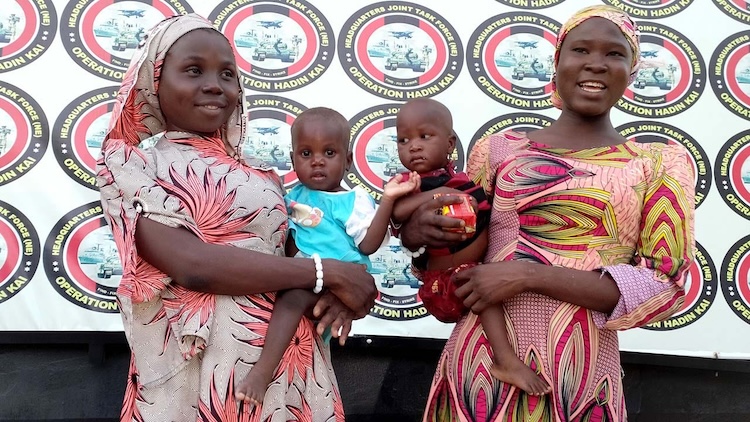By Lisa Vives, Global Information Network
NEW YORK | 15 April 2024 (IDN) — Today marks 10 years since 276 girls were abducted from the Chibok secondary school in Borno state in one of the most high-profile mass abduction cases in Nigeria.
About 90 of the girls are still missing. Fifty-seven escaped as they were being carted off to the group’s base in the vast, ungoverned Sambisa forest 40 miles southeast of Maiduguri.
About a third of the missing Chibok students are believed to have died in captivity. Many defiant hostages who refused to be married to Boko Haram fighters are believed to have been forced into sexual slavery, domestic servitude or used as suicide bombers.
But some of them, like Ms Jinkai Yama, have decided to remain married to one of the fighters who once held her captive.
Jinkai, one of 20 Chibok girls, now resides with her husband in the city of Maiduguri —Borno’s capital—in housing organized by the state’s governor, Babagana Umaru Zulum.
“I am not happy with what the governor did,” said Jinkai’s distraught father Yama Bullum. “The girls managed to come out of the forest and the governor married them off again. Her mother is very angry.”
He found out about his daughter when she called him up last August and handed over the phone, asking him to talk to her husband, the former insurgent.
Until then, Mr Bullum had assumed she was with other freed Chibok captives and her three children in a special welfare program.
Allowing the freed women to live with their former captors as wives, while their accommodation is provided by the government, is perceived by the parents as Governor Zulum sacrificing their daughters in the quest for stability in the region.
They see these marriages as a way to appease the former militants.
These “marriages” have further upset parents whose children were forced to convert to Islam during captivity.
“Some people in Chibok are saying: ‘How is it possible after the rescue of the girls they are still remaining in the Muslim faith?”asked Yakubu Nkeki, chair of the Chibok parents’ association.
Most of the girls taken from the Chibok school were Christian.
The state appears to be grappling with the dilemma of respecting the girls’ wishes while fulfilling the desires of their parents.
“My only interest is that we don’t want these girls to go back to the bush again,” said Borno Governor Zulum.
“Even before they came out [of the Sambisa Forest], some of them gave us conditions – that they will not come without their husbands.”
One of these women, Aisha Graema, told me she would never have left the forest if she couldn’t be with the militant she married two years after being abducted from the Chibok school.
Another Chibok girl, Mary Dauda, said she couldn’t have escaped from Sambisa without her husband, who helped her sneak away from the militants’ hideout.
“We had agreed that he would join me afterwards and present himself to the governor for rehabilitation,” said the 27-year-old.
“I first came out of the forest and then he followed me. There in the bush, we had no relative, no brother, no sister. That is why we decided to come out.
“He finished deradicalization before we were allowed to stay together. The government welcomed us, gave us food, shelter, everything.”
Zuwaira Gambo, Borno state commissioner for women’s affairs and social development, insists the women were in no way coerced into staying with their spouses.
“I asked them: ‘How can you want to stay with this man who destroyed your life?’ and they told me: ‘You won’t understand.'”
Experts attribute this to several factors, including the sense of belonging fostered by being part of the insurgent group, indoctrination into its extremist beliefs, the development of romantic attachments over time and the formation of family bonds, particularly when they have children together.
Additionally, acts of kindness and care such as being showered with gifts by their captors, may contribute to these feelings.
“(Their captors) took the time to convince them that what they had known before was the wrong way,” said Fatima Akilu, a psychologist who has worked with many freed captives taken in their formative years.
But the story of the Chibok girls stands out because of the government’s active support for them and their husbands staying together.
The chair of the Association of Parents of the Missing Girls from Chibok says he finds himself torn between the grievances of the parents and the rights of the young women.
“The girls told me that they can’t do without their husbands,” Mr Nkeki admitted. [IDN-InDepthNews]
Photo: Two women holding babies. Source: Global Information Network
IDN is the flagship agency of the Non-profit International Press Syndicate


